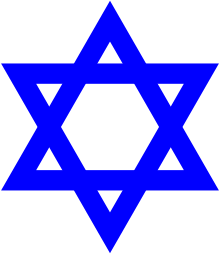History of the Jews in Bolivia
| Total population | |
|---|---|
| 500 | |
| Regions with significant populations | |
| La Paz · Cochabamba · Santa Cruz de la Sierra | |
| Languages | |
| Spanish · Hebrew · Yiddish | |
| Religion | |
| Judaism · Jewish secularism |
The history of the Jews in Bolivia stretches from the independence of Bolivia in the year 1825 to the end of the 19th century. At the time, Jewish merchants (both Sephardim and Ashkenazim) came to Bolivia, most of them taking local women as wives and founding families that merged into the mainstream Catholic society. This was often the case in the eastern regions of Santa Cruz, Tarija, Beni and Pando, where these merchants came either from Brazil or Argentina.
During the 20th century, substantial Jewish settlement began in Bolivia. In 1905, a group of Russian Jews, followed by Argentines, settled in Bolivia. In 1917, it was estimated that there were only 20 to 25 professing Jews living in the country. By 1933, when the Nazi era in Germany started, there were 30 Jewish families. The first huge influx of Jewish immigrants was in the 1930s and there were 7,000 of them estimated at the end of 1942. During the 1940s, 2,200 Jews emigrated from Bolivia. But the ones who remained have settled their communities in La Paz, Cochabamba, Oruro, Santa Cruz, Sucre, Tarija and Potosí. After World War II, a small amount of Polish Jews came to Bolivia. By 1939, Jewish communities gained greater stability in the country.
In recent decades, the Jewish community of Bolivia has declined significantly, many of them migrating to other countries such as Israel, the United States and Argentina.[1] The Jewish community in Bolivia has approximately 500 members with an enlarged population of 700, most of them located in Santa Cruz de la Sierra, followed by La Paz and Cochabamba, having the presence of synagogues in all these cities.[2]
20th century
In 1938, German, Polish and Lithuanian Jewish immigrants who settled in La Paz established the La Paz Jewish Cemetery (Spanish: Cementerio Judío de La Paz).
Agricultural Colonies
During the 1938-1940 immigration wave, Jewish refugees received help from the German Jewish businessman Maurice Hochschild who had investments in Bolivia. He helped get visas for Jewish immigrants from Europe and helped found the Sociedad de Proteccion a los Immigrantes Israelitas. Working with the Sociedad Colonizadora de Bolivia, Maurice Hochschild helped develop rural agricultural projects for Jewish refugees. The refugees, however, faced many difficulties and the farms were never able to become self-sufficient.[3]
21st century
As of 2015 it is estimated that the Jewish community in Bolivia decreased gradually and lacks youth, as they end high school, go to universities abroad, especially in Argentina, Brazil, the United States and Israel, and do not return. The Boliviano Israelita School, located in La Paz, has 294 students, of whom only one is Jewish.[4]
In the 1990s the community had about 700 members, while in the 2000s this figure dropped to just 500. If this emigration trend continues, the Jewish population of Bolivia would disappear almost completely over a period 10 to 20 years.[1]
Despite these discouraging trends, the community is still struggling to maintain Jewish life and culture in the country.
Antisemitism
In recent decades the degree of antisemitism in Bolivia has been considerably increased by various groups and at various times. During the administration of Germán Busch Becerra, in the 1930s, the Jewish community achieved a sustained stability. However, the presidents who succeeded Busch were less enthusiastic about Jewish migration, manifesting antisemitism on several occasions, mainly in the cities of La Paz and Cochabamba, where there were unfortunate attacks on Jewish businesses and community agencies.[5] The religious buildings are not exempt from attacks, since the Synagogue of Cochabamba, in the centre of the country, was attacked in 2014, being damaged by stones and attacks with Molotov cocktails. During the administration of Evo Morales antisemitism has worsened. In January 2009, the Morales government broke ties with Israel, declaring it a "terrorist and genocidal state". Also, the Bolivian government cancelled an agreement established in 1972 which allowed Israeli citizens to visit the Andean country without a previous visa.[6]
Another case of antisemitism by the Bolivian government took place on 12 August 2014 from the President of the Chamber of Deputies, Marcelo Elío Chávez, belonging to the Movement for Socialism, stating publicly that:
"Unfortunately, the Jewish people, who were massacred during World War II, did not learn the lesson and now joins with US imperialism."[7]
See also
References
- 1 2 delacole.com. "La Voz Judía" (in Spanish). Retrieved 2013-12-23.
- ↑ Congreso Judío Latinoamericano. "Comunidades judías latinoamericanas: Bolivia" (in Spanish). Retrieved 21 December 2014.
- ↑ "Uncovering Jewish History in Bolivia". American Jewish Joint Distribution Committee. January 14, 2014. Retrieved 20 April 2015.
- ↑ ITON GADOL (4 December 2015). "Preocupación en la comunidad judía de Bolivia: "Calculamos una sobrevida máxima de 15 a 20 años"" (in Spanish). Retrieved 19 March 2016.
- ↑ "Storm Clouds over the Bolivian Refuge", by Sherry Mangan, Commentary Magazine, 1952
- ↑ ITON GADOL. "Un grupo judío americano pide al Presidente de Bolivia que actúe contra el antisemitismo" (in Spanish). Retrieved 1 January 2015.
- ↑
External links
- Jews from Bolivia (Spanish)
